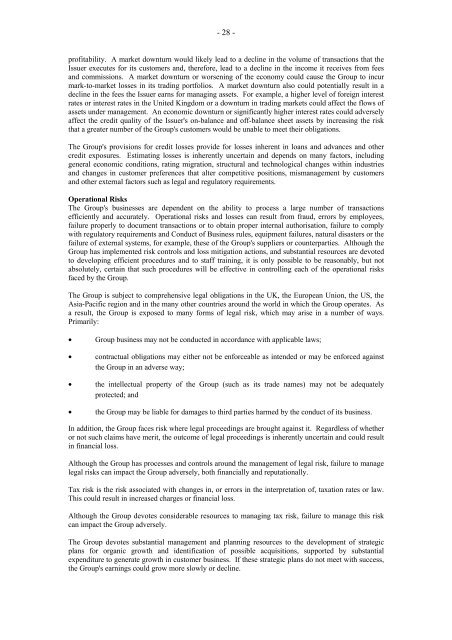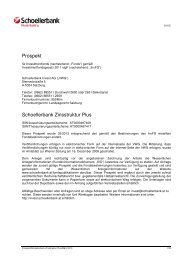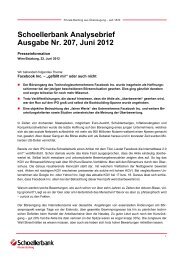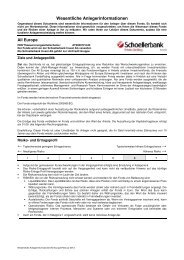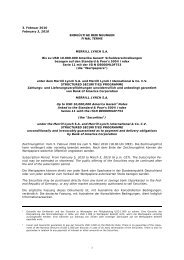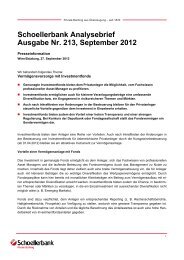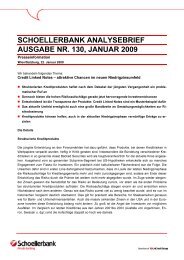Barclays, Base Prospectus 2006
Barclays, Base Prospectus 2006
Barclays, Base Prospectus 2006
Create successful ePaper yourself
Turn your PDF publications into a flip-book with our unique Google optimized e-Paper software.
- 28 -<br />
profitability. A market downturn would likely lead to a decline in the volume of transactions that the<br />
Issuer executes for its customers and, therefore, lead to a decline in the income it receives from fees<br />
and commissions. A market downturn or worsening of the economy could cause the Group to incur<br />
mark-to-market losses in its trading portfolios. A market downturn also could potentially result in a<br />
decline in the fees the Issuer earns for managing assets. For example, a higher level of foreign interest<br />
rates or interest rates in the United Kingdom or a downturn in trading markets could affect the flows of<br />
assets under management. An economic downturn or significantly higher interest rates could adversely<br />
affect the credit quality of the Issuer's on-balance and off-balance sheet assets by increasing the risk<br />
that a greater number of the Group's customers would be unable to meet their obligations.<br />
The Group's provisions for credit losses provide for losses inherent in loans and advances and other<br />
credit exposures. Estimating losses is inherently uncertain and depends on many factors, including<br />
general economic conditions, rating migration, structural and technological changes within industries<br />
and changes in customer preferences that alter competitive positions, mismanagement by customers<br />
and other external factors such as legal and regulatory requirements.<br />
Operational Risks<br />
The Group's businesses are dependent on the ability to process a large number of transactions<br />
efficiently and accurately. Operational risks and losses can result from fraud, errors by employees,<br />
failure properly to document transactions or to obtain proper internal authorisation, failure to comply<br />
with regulatory requirements and Conduct of Business rules, equipment failures, natural disasters or the<br />
failure of external systems, for example, these of the Group's suppliers or counterparties. Although the<br />
Group has implemented risk controls and loss mitigation actions, and substantial resources are devoted<br />
to developing efficient procedures and to staff training, it is only possible to be reasonably, but not<br />
absolutely, certain that such procedures will be effective in controlling each of the operational risks<br />
faced by the Group.<br />
The Group is subject to comprehensive legal obligations in the UK, the European Union, the US, the<br />
Asia-Pacific region and in the many other countries around the world in which the Group operates. As<br />
a result, the Group is exposed to many forms of legal risk, which may arise in a number of ways.<br />
Primarily:<br />
• Group business may not be conducted in accordance with applicable laws;<br />
• contractual obligations may either not be enforceable as intended or may be enforced against<br />
the Group in an adverse way;<br />
• the intellectual property of the Group (such as its trade names) may not be adequately<br />
protected; and<br />
• the Group may be liable for damages to third parties harmed by the conduct of its business.<br />
In addition, the Group faces risk where legal proceedings are brought against it. Regardless of whether<br />
or not such claims have merit, the outcome of legal proceedings is inherently uncertain and could result<br />
in financial loss.<br />
Although the Group has processes and controls around the management of legal risk, failure to manage<br />
legal risks can impact the Group adversely, both financially and reputationally.<br />
Tax risk is the risk associated with changes in, or errors in the interpretation of, taxation rates or law.<br />
This could result in increased charges or financial loss.<br />
Although the Group devotes considerable resources to managing tax risk, failure to manage this risk<br />
can impact the Group adversely.<br />
The Group devotes substantial management and planning resources to the development of strategic<br />
plans for organic growth and identification of possible acquisitions, supported by substantial<br />
expenditure to generate growth in customer business. If these strategic plans do not meet with success,<br />
the Group's earnings could grow more slowly or decline.


